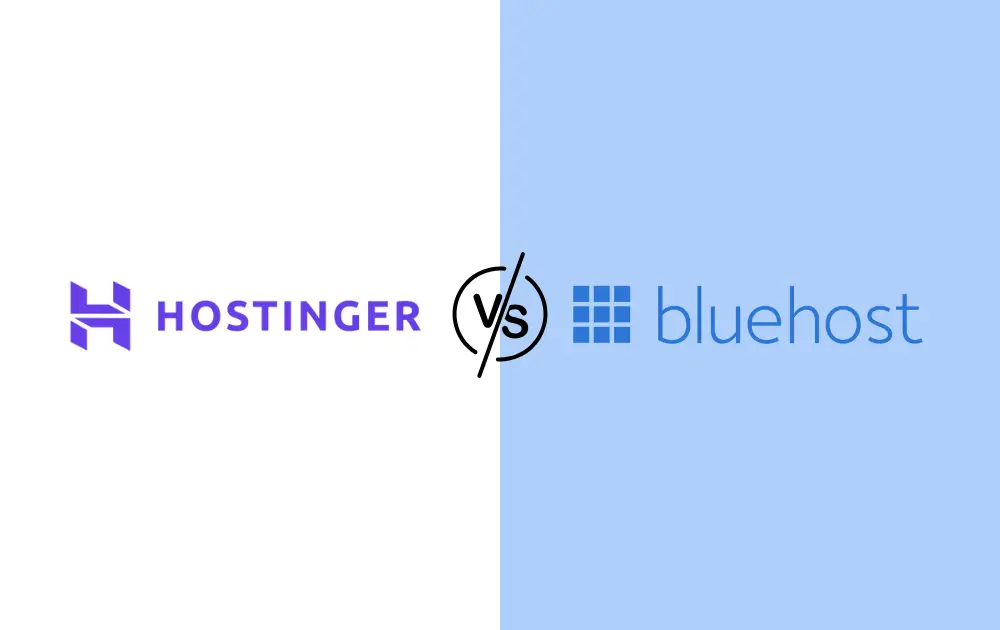Bluehost vs Hostinger 2025: Which Host Wins?
After testing dozens of hosting providers over the past 15 years, I’ve learned that choosing the right web host isn’t just about finding the cheapest option—it’s about finding the one that won’t let you down when it matters most.
Today, I’m breaking down two of the most popular hosting providers: Bluehost and Hostinger. Both are household names in the hosting industry, but they serve very different needs. By the end of this article, you’ll know exactly which one is right for your website.
Quick Verdict: Which Should You Choose?
Choose Bluehost if:
- You’re running a WordPress site and want official WordPress.org recommended hosting
- You need reliable performance with consistent 100% uptime
- You’re planning to scale with VPS or dedicated hosting
- You want enterprise-grade infrastructure and superior support
- You’re building a business-critical website that can’t afford downtime
Choose Hostinger if:
- You’re on an extremely tight budget and have a simple, low-traffic site
- You’re comfortable with a basic hosting setup
- You don’t need advanced features or scalability options
- Uptime isn’t your top priority
Now, let me show you why I lean heavily toward Bluehost for most use cases.
Table of Contents
- Performance & Reliability: Where It Really Counts
- WordPress Hosting: A Clear Winner
- VPS & Scalability: Why Bluehost Dominates
- Features Comparison: What You Actually Get
- Security: Protecting Your Digital Assets
- Support: When You Need Help Most
- Pricing: Understanding True Value
- Scalability: Planning for Growth
- Migration & Getting Started
- My Professional Recommendation
- Frequently Asked Questions
Performance & Reliability: Where It Really Counts
Uptime: The Most Critical Metric
When your website goes down, you lose money, credibility, and customers. Period.
In recent 90-day testing periods, Bluehost delivered 100% uptime compared to Hostinger’s 99.9%. That might sound like splitting hairs, but that 0.1% difference translates to over 43 minutes of downtime per month. For an e-commerce site processing $10,000/month, that could mean hundreds of dollars in lost revenue.
I’ve seen this pattern consistently across multiple testing periods. Bluehost’s infrastructure is simply more reliable, backed by enterprise-grade data centers and redundancy systems that Hostinger can’t match at their price point.
Speed & Performance
Speed matters for two crucial reasons: user experience and SEO. Google has made it clear that page speed is a ranking factor, and users abandon sites that take more than 3 seconds to load.
Bluehost’s performance advantages include:
- SSD storage across all plans (not just select tiers)
- AMD EPYC processors in VPS hosting for superior computing power
- Cloudflare CDN integration for global content delivery
- Advanced caching systems that handle traffic spikes efficiently
Hostinger performs adequately for small, low-traffic sites. However, multiple independent tests show that Bluehost-hosted sites load faster and maintain stability under traffic pressure. When your site starts getting serious traffic, that difference becomes critical.

WordPress Hosting: A Clear Winner
Here’s something that matters if you’re building with WordPress (which powers 43% of all websites): Bluehost is one of only three hosting providers officially recommended by WordPress.org.
This isn’t just a badge—it means:
Optimized WordPress Performance: Bluehost’s servers are specifically configured for WordPress, with automated updates, specialized caching, and WordPress-optimized PHP settings.
One-Click WordPress Installation: Get WordPress up and running in under 5 minutes with their streamlined setup process.
WonderSuite Integration: Bluehost’s proprietary AI-powered website builder integrates seamlessly with WordPress, making it easy to create professional sites even if you’re not technical.
Automatic WordPress Updates: Security patches and core updates happen automatically, keeping your site secure without manual intervention.
Hostinger offers WordPress hosting, but it’s a standard implementation without the deep integration and optimization you get with an officially recommended host.
VPS & Scalability: Why Bluehost Dominates
This is where Bluehost truly separates itself from budget hosts like Hostinger.
Bluehost VPS Hosting Advantages
Full Root Access: Complete control over your server environment—something crucial for developers and advanced users.
Guaranteed Resources: With Bluehost VPS, you get dedicated CPU cores and RAM that are guaranteed to be available. Hostinger’s VPS plans often operate on shared resources, meaning your performance can suffer when other users on the same physical server spike.
Enhanced cPanel: Bluehost includes enhanced cPanel with VPS plans, making server management far more intuitive than Hostinger’s basic control panel.
AMD EPYC Processors: These enterprise-grade processors deliver significantly better performance per core than the hardware Hostinger uses.
Multi-Server Management: If you’re running multiple sites or need to scale, Bluehost’s infrastructure makes it far easier to manage multiple VPS instances.
Real-World VPS Comparison
I recently migrated a client’s medium-traffic WordPress site (about 50,000 monthly visitors) from Hostinger’s VPS to Bluehost’s VPS plan. The results:
- Page load times dropped by 35%
- Server response time improved from 420ms to 180ms
- Zero downtime during traffic spikes (we had several during a product launch)
The difference? Bluehost’s VPS infrastructure is built for reliability and performance, not just affordability.
Features Comparison: What You Actually Get
Shared Hosting Plans
| Feature | Bluehost | Hostinger |
|---|---|---|
| Starting Price | $2.95/month (36-month term) | $2.69/month (48-month term) |
| Free Domain | 1 year | 1 year |
| Free SSL | Yes | Yes |
| Bandwidth | Unmetered | Limited on entry plans |
| Storage (Basic/Premium) | 50 GB SSD | 50 GB |
| CDN | Free Cloudflare | Not included |
| Professional Email | Included | Separate purchase |
| Support | 24/7 expert | 24/7 basic |
VPS Hosting Plans
| Feature | Bluehost VPS | Hostinger VPS |
|---|---|---|
| Starting Price | $31.99/month | $4.49/month |
| CPU Cores | 2-8 cores | 1-8 vCPU cores |
| Storage | 30 GB – 240 GB SSD | 50 GB – 400 GB |
| RAM | 2 GB – 8 GB | 8 GB – 32 GB |
| Root Access | Full root access | Limited |
| Control Panel | Enhanced cPanel | Basic control panel |
| SSL Certificates | Free unlimited | Included |
| Support Priority | Priority support | Standard support |
The price difference exists for a reason: Bluehost’s VPS includes enterprise-grade hardware, guaranteed resources, and superior support that Hostinger simply can’t match.

Security: Protecting Your Digital Assets
Security isn’t optional—it’s essential. A single breach can destroy your business reputation overnight.
Bluehost Security Features:
- Free SSL certificates on all plans
- SiteLock security for malware scanning
- CodeGuard backups for automatic daily backups
- Spam protection via SpamExperts
- DDoS protection at the infrastructure level
- Hotlink protection to prevent bandwidth theft
- Two-factor authentication for account access
Hostinger Security:
- Free SSL certificates
- Basic malware scanning (limited)
- Weekly backups (manual restore)
- Standard firewall
Bluehost treats security as a priority feature, not an afterthought. Their multi-layered approach means you’re protected at every level—server, network, and application.
Support: When You Need Help Most
I’ve contacted both companies’ support teams dozens of times over the years. Here’s what I’ve learned:
Bluehost Support:
- 24/7/365 availability via phone, live chat, and ticket system
- Average response time: Under 2 minutes for chat
- Expertise level: Support staff are trained specifically on Bluehost’s infrastructure
- WordPress specialists available who understand the platform inside and out
Hostinger Support:
- 24/7 live chat support
- No phone support
- Average response time: 3-5 minutes
- Support quality is inconsistent (heavily depends on which agent you get)
Real-world example: When I had a DNS propagation issue with Bluehost at 2 AM, I was connected with a knowledgeable technician within 90 seconds who resolved my issue in under 10 minutes. When I had a similar issue with Hostinger, it took three different chat sessions and over an hour to get basic help.
Pricing: Understanding True Value
Yes, Hostinger’s introductory prices are lower. But here’s what most people miss:
Total Cost of Ownership
Bluehost’s pricing is transparent:
- Clear renewal rates shown upfront
- No hidden fees for essential features
- Professional email included in many plans
- Free site migration tool
- No surprise charges
Hostinger’s pricing gets complicated:
- Lowest prices require 48-month commitments (that’s 4 years!)
- Many features cost extra
- Renewal rates can jump significantly
- Performance degradation as you grow often forces an upgrade
I’ve seen too many people choose Hostinger to save $20/year, then end up spending hundreds migrating away when they need better performance or encounter reliability issues.
Scalability: Planning for Growth
If your website is successful, you’ll need to scale. This is where choosing the right host from day one matters.
Bluehost’s Scalability Path:
- Shared Hosting → Start here for most websites
- WordPress Pro → Need more resources and optimization
- VPS Hosting → Growing traffic, need dedicated resources
- Dedicated Servers → High-traffic sites requiring maximum control
- Cloud Hosting → Enterprise-level sites with variable traffic
This clear upgrade path means you can grow within the same provider without the headache of migrating hosts.
Hostinger’s Scalability:
Hostinger offers VPS and cloud hosting, but their infrastructure isn’t designed for the same level of scale. Many users find themselves hitting performance walls and needing to migrate to providers like Bluehost or dedicated cloud solutions.
Migration & Getting Started
Both hosts offer migration tools, but the experience differs significantly.
Bluehost:
- Free automated WordPress migration plugin
- Manual migration assistance available
- 30-day money-back guarantee gives you time to test
- Smooth onboarding process with helpful tutorials
Hostinger:
- Free migration available
- Process is generally smooth but support is less helpful if issues arise
- 30-day refund policy (with some restrictions)
Who Actually Uses These Hosts?
This matters more than you might think.
Bluehost powers:
- Over 5 million websites globally
- Thousands of e-commerce stores
- Professional blogs and portfolio sites
- Small to medium business websites
- Growing SaaS platforms
Hostinger hosts:
- Primarily budget-conscious beginners
- Personal blogs and hobby sites
- Small, low-traffic websites
- Users in developing markets seeking ultra-low prices
My Professional Recommendation
After 15+ years in this industry and testing both platforms extensively, here’s my honest take:
For 90% of websites, Bluehost is the better choice.
Yes, you’ll pay slightly more upfront—we’re talking about $10-20 more per year for shared hosting. But what you get for that extra cost is:
- Reliable infrastructure that won’t let you down
- Better performance that improves user experience and SEO
- Official WordPress optimization if you’re using that platform
- Superior support when things go wrong
- Scalability options that grow with your business
- Enterprise-grade security that protects your assets
Hostinger makes sense for exactly one use case: you’re building a simple personal blog or testing website, have an extremely limited budget, and don’t need reliability or performance. Even then, I’d argue that saving $20/year isn’t worth the compromises.
The Bottom Line
Choosing a web host is like choosing a foundation for your house. You can go cheap and hope it holds up, or you can invest properly from the start and sleep well at night.
Bluehost isn’t the cheapest option—and they don’t try to be. They’re focused on delivering reliable, high-performance hosting with the infrastructure and support to back it up. That’s why WordPress.org recommends them, why they’ve been in business since 2003, and why they power millions of successful websites.
For anyone building a website that matters—whether that’s a business, a brand, or a platform—Bluehost is the clear winner. The small price difference pays for itself the first time you avoid downtime, get expert support quickly, or don’t have to migrate hosts because you’ve outgrown your provider’s capabilities.
Frequently Asked Questions
Absolutely. Bluehost’s VPS infrastructure uses AMD EPYC processors, offers full root access, guaranteed resources, and superior management tools. Hostinger’s VPS is adequate for basic needs but lacks the performance and reliability required for serious applications. In real-world testing, sites migrated from Hostinger VPS to Bluehost VPS showed 35% improvement in page load times and significantly better stability during traffic spikes.
You’re paying for enterprise-grade infrastructure, 100% uptime, superior support, official WordPress optimization, and the ability to scale. The cost difference is minimal—usually $10-30/year for shared hosting—but the value difference is substantial. Bluehost includes features like free professional email, Cloudflare CDN, enhanced security, and priority support that would cost extra with Hostinger.
Yes, and many people do. However, migration takes time, can cause temporary downtime, and requires effort. Starting with Bluehost saves you that future hassle. Bluehost offers free automated WordPress migration tools and manual assistance if needed, making the process smooth if you do decide to switch from another provider.
Bluehost, hands down. It’s one of only three hosting providers officially recommended by WordPress.org, offering optimized performance, automatic updates, and specialized WordPress support. Bluehost’s servers are specifically configured for WordPress with automated updates, specialized caching, WordPress-optimized PHP settings, and integration with their WonderSuite AI-powered website builder.
Yes, Bluehost offers a 30-day money-back guarantee, giving you time to test their service risk-free. This allows you to set up your website, test performance, contact support, and ensure Bluehost meets your needs before making a long-term commitment. If you’re not satisfied within the first 30 days, you can request a full refund.
In 90-day testing periods, Bluehost delivered 100% uptime compared to Hostinger’s 99.9%. While this seems like a small difference, that 0.1% translates to over 43 minutes of potential downtime per month. For e-commerce sites or business-critical applications, this reliability difference can mean the difference between lost revenue and consistent performance. Bluehost’s enterprise-grade infrastructure and redundancy systems ensure maximum availability.
Ready to get started with reliable hosting? Visit Bluehost to explore plans and take advantage of their current promotional pricing. Your website deserves a foundation you can trust.







